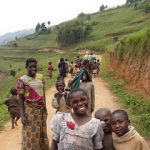Personal contacts
Intro: Sofia, the capital of Bulgaria, is an old modern city of cobblestone streets and ubiquitous cafes serving coffee frappes and cappuccino–and pizza for breakfast. 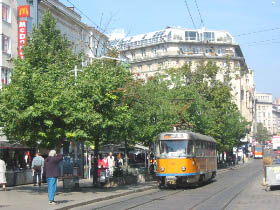 There are electric trolley cars, cute T-shirted guys, gypsy beggars, orthodox prelates, cell phone addicts and newspaper kiosks displaying dozens of girlie magazines—but not a single gay rag. It’s a city of grand baronial architecture and recent communist facades, stylish boutiques and ancient orthodox churches.
There are electric trolley cars, cute T-shirted guys, gypsy beggars, orthodox prelates, cell phone addicts and newspaper kiosks displaying dozens of girlie magazines—but not a single gay rag. It’s a city of grand baronial architecture and recent communist facades, stylish boutiques and ancient orthodox churches.
By Richard Ammon
GlobalGayz.com
This buzzing capital city is also an Eastern European vortex of repressive broken empires and energetic future enterprise seeking engagement in the European Union. Nouveau prosperity rides around in sporty SUVs while most others walk or take a trolley, and it’s not unusual to see a manual worker driving a horse cart downtown. It’s a city of ingrained prejudice against homosexuals and a lively, rebellious and progressive activist organization.
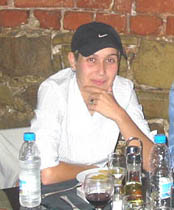
‘Soldier’-Head of Gemini
With and without intention I encountered a small cross-section of Bulgaria’s gay society in a cozy brick-walled restaurant one evening in central Sofia. My two dinner hosts were the President of Bulgaria’s LGBT organization, Ms. Desislava Petrov, aka ‘Soldier’, and George Georges, a lawyer–two very different members of Bulgaria’s LGBT community.
Also present in the room were two ‘accidental’ gay parties–our handsome young waiter and a four-person table of two couples sitting across from us. Without fanfare or flourish, there we were, nine gay folks in a corner of Machaloto Restaurant doing what gay people do in Sofia…and Berlin, London, Budapest or Chicago: enjoying the evening with friends over chat and chatter with good food brought by an very attentive and subtle server. The evening could have been anywhere.
By candlelight, among hushed tones, in no hurry, lingering over chocolate desserts and cappuccino, we shared an unworried time with polite, discreet and enjoyable comrades talking local gossip or international gay politics. The scene was remarkable in its un-remarkableness: peaceful, undisturbed and courteously treated by the restaurant staff. We paid and left, chatted a bit more, hailed a taxi and left for our hotel.
Surface and Reality
Our evening dinner was both an authentic moment and a deception; it was real and a pretense; a comfortable yet cautious passing.
Homosexuals in Sofia, Bulgaria are not part of the accepted social order yet there are countless legions of them/us participating in the pulse of everyday life in the post communist order of things. Behind the nice clothes, calm talk and tasty food that evening, each of those gay and lesbian citizens had stories to tell that belie the calm of modern Sofia–stories of rejection, confusion, alienation, discrimination, hiding and fear.
Soldier told of being bashed by mafia-type guys one night in a bar. At knife point she suffered a concussion after bring hit by one of them. On a visit to Romania she was threatened and harassed by police for trying to help a sick friend along a sidewalk. Another lesbian friend (in Bulgaria) of hers was forced to resign from her small town teaching job because of rumors that she was gay. With no recourse or protection (she was not out to her family) she had to quit and move to Sofia where she could get support and counseling from LGBT Gemini.
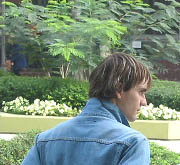 George, who has traveled all over Europe, added that to be seen as gay is to be seen as weak, less than a ‘full’ man. The tradition in Bulgaria, as in most of the world, is to prove manhood by taking a wife and producing offspring. The naive opinion of most people is that gays are socially defective transvestites. “The government doesn’t have a clue about sexual orientation. The only reason they changed the law was because of the EU. They want to be seen as a European equal.” (Anti-discrimination legislation, protecting sexual minorities, was approved by the government council in 2002 and passed by the parliament in September 2003. It becomes law in January 2004.) “But changing the law doesn’t make individual gays feel more safe or brave,” he added.
George, who has traveled all over Europe, added that to be seen as gay is to be seen as weak, less than a ‘full’ man. The tradition in Bulgaria, as in most of the world, is to prove manhood by taking a wife and producing offspring. The naive opinion of most people is that gays are socially defective transvestites. “The government doesn’t have a clue about sexual orientation. The only reason they changed the law was because of the EU. They want to be seen as a European equal.” (Anti-discrimination legislation, protecting sexual minorities, was approved by the government council in 2002 and passed by the parliament in September 2003. It becomes law in January 2004.) “But changing the law doesn’t make individual gays feel more safe or brave,” he added.
Social Changes
Two things are happening at the same time in Bulgaria—and in other societies in modern Eastern Europe.
(1) Homophobia and fear of authority are still strong. Political and religious persecution for most to the 20th century has left emotional cultural scars, in varying degrees, on most homosexuals. Most gays are closeted and fearful so they stay away from the 8 or 10 gay bars/discos in Sofia. Reflecting on this a few days later, George mused, “Gay guys are confused in their own complexity. We all want the next cute face and body, and when we have it we are afraid of it. And when it’s gone we are even more empty.”
He continued, “Deep within we look for a constant partner who can consolidate or strengthen our fragile sense of stability. Yet, we doubt he can or should be trusted fully. Plus we (mostly men) can’t resist our eternal passion for variety and keep looking around. I know there are always exceptions and some people have solid relationships. I find the word “cruising” a very fit explanation for the perplexed and, to some extent, ‘mad soul’ in us. Homosexuals are afraid of themselves (personal homophobia) and society is afraid of them as well (public homophobia).”
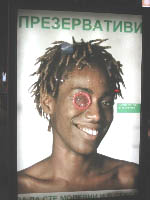
Condom Ad “Responsibility”
(2) Yet things are changing. Said Soldier in response to George’s dour cautions: “To some extent Sofia is only missing simply the (gay population) size like in Berlin. However, Bulgaria is probably one of the most westernized cultures in Eastern Europe, and for sure, the most western in the Balkans. The women are highly emancipated here and some gays are beginning not to be afraid to be open.”
“There are problems related to the general acceptance that men should marry, but that is so rapidly disappearing nowadays that i think the next few years will witness completely new sense of attitude. Example: If you just visit the largest cruising park in Sofia (Aleya Yavorov – Yavorov alley) you will see lots of young men who may actually have girlfriends. You may even see our waiter from the restaurant. His next step is entering a gay club in a year or so.”
This desire and readiness is also reflected in the flood of gay porno coming out of Eastern Europe. Certainly driven by money to strip down and perform for the camera, it can also be argued that there is a desire to ‘show off’ after years of repression by the communists and a decade of being a ‘second-hand’ Europe. As George suggested playfully, “Bulgaria has, in my opinion, some of the most handsome guys in the world, but it will take sometime that the usual 10% actually realize what they really like.”
Gay Sofia
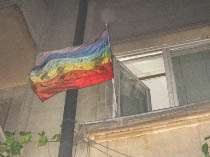 “Bulgaria’s capital city, Sofia, continues to attract people from the gay community, not only because it is the biggest city, offering anonymity and distance from relatives, but also because of the strong commercial gay scene (bars, clubs, discos, cruising areas). People are more ‘out of the closet’ and it is easier to find a partner.
“Bulgaria’s capital city, Sofia, continues to attract people from the gay community, not only because it is the biggest city, offering anonymity and distance from relatives, but also because of the strong commercial gay scene (bars, clubs, discos, cruising areas). People are more ‘out of the closet’ and it is easier to find a partner.
“There were some attempts to estimate the number of LGBT people in Sofia, especially gay men, but there were problems with this because of the various self-categorizations: gay; bisexuals; men having sex with men who identify as gay; men having sex with men sporadically–called ‘curious’, not identifying as gay. As a result, attempts fail to produce any accurate results.”
This description of gay Sofia is from the Bulgarian LGBT Gemini web site (http://www.bgogemini.org/bg/index.php). Not unlike any major metropolitan capital city LGBT citizens pervade the entire spectrum of the culture. From the velvet closets of wealthy elite families to the impoverished unemployed migrant worker family, queer men and women seek out contacts and mates using the sophistication of the Internet or the furtive shadows of a cruise park or the colorful late night discos.
The most popular gay venue in Sofia has been Spartacus, a huge disco ‘under’ the university in the downtown area, a stone’s throw from the national Parliament. It’s along a pedestrian underpass in front of the beautiful ornate buildings of the university. It could hardly be more centrally located. There is no hiding here. Many of the locals gather mostly on weekend nights to dance and drink and be with friends and LGBT strangers. As luck would have it, the day I checked it out (in late September 2003) there was a closed sign on the door. Apparently it was undergoing some renovations and was due to reopen in October 2003 with a grand party.
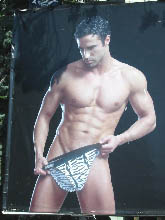 There are several other venues to choose from. Soldier ticked off a list of current clubs and discos that were gay or gay-friendly. (In the past five years it has become harder to find a ‘pure’ gay place as the younger gen-y straight kids are finding the gay venues have the best music and décor.) In addition to Spartacus the other watering holes in Sofia include: Luna Lounge, Kayo’s, George, Why Not?, Flamingo, Expose, Vital-LS, and Club Amor. Places come and go so ‘check the listings’ in Bulgayria.com.
There are several other venues to choose from. Soldier ticked off a list of current clubs and discos that were gay or gay-friendly. (In the past five years it has become harder to find a ‘pure’ gay place as the younger gen-y straight kids are finding the gay venues have the best music and décor.) In addition to Spartacus the other watering holes in Sofia include: Luna Lounge, Kayo’s, George, Why Not?, Flamingo, Expose, Vital-LS, and Club Amor. Places come and go so ‘check the listings’ in Bulgayria.com.
Also, it’s an interesting cultural footnote that Sofia (population 900,000) has so many gay venues while Bucharest, the capital of Romania that we also visited on this trip, with a much larger population (2.2 million), only has one gay venue. One observer thought the Bulgarians were more daring and defiant of authority than the Romanians and willing to take more risks. There may be some truth to this as Romania was cowed by an evil and brutal dictator from 1965-1989. As well, the homophobic Romanian Orthodox church seems to have more influence over the people than the Bulgarian Greek Orthodox church.
George also commented, “there are around 10 gay bars in Sofia at the moment, a place with gay porno and dark rooms, and hopefully, within the next year or so Sofia can have its own gay sauna. The actual problems of opening such places in Bulgaria come from, first, the fact that you may have to deal with the mafia structures which control most of the entertainment business (and more) in Bulgaria.
“Second is the problem of profitability. Those two factors have more to do with any business undertaking and don’t necessarily relate to the acceptability of the gays. As everywhere else, there are people who are outgoing and cruise at gay bars and there are people who want to keep lower profile; those proportions vary from country to country,”
Roles and positions
In a later e-mailed I asked George if Bulgarian gay guys were easy to date? Are they personally/sexually flexible? Do they have hang-ups about being tops or bottoms and assuming different roles? Do they feel their attractions and love have validity worth standing up for. (Versus countries like Cambodia or Indonesia’s Sumatra where guys feel there is no possibility for genuine gay feelings or long-term lovers.)
George: “I think here many gay guys want to be on the safe side playing it “versatile”. As in the US, I found out that a lot of the masculine guys would like to feel dominated, which is part of the psychology of dominism. The man is created to adore something else and in most cases we like the image of the real man. So there is nothing wrong with the muscular guys being fucked; it’s part of the game. And when it comes to love, it is usually the bottom guys who fall in love with their top partners. So there is a set-up conflict between this outward strong man image and the inward feeling of desire or need. That doesn’t feel good. It’s scary and nervous…butch images and softy feelings.
And if you ask me whether I believe in love, my answer is – yes, I very much do. It is the best thing that has happened to me and is my driving force in life. I just hope one day I would be able to live with the guy I found and that both of us can recover from all the pain we have caused each other. As rightly he has pointed out to me 6 years ago – ‘you know that I am the man of your life, don’t you? What’s better than that?’”
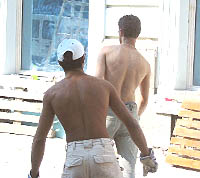 So the struggle for intimacy is indeed a universal one that transcends tall mountains and artificial borders, within and without. I sensed there is a silent sort of harsh fragility in and around same-gender love and intimacy in former communist states. These are cultures in which human feelings were brutalized through repression and deprivation for four generations. To be individually different was to risk one’s life or one’s family’s safety. From such emotional ashes trust is slow to rekindle. Self-assurance and modest feelings of entitlement (such as gay pride) are tentative.
So the struggle for intimacy is indeed a universal one that transcends tall mountains and artificial borders, within and without. I sensed there is a silent sort of harsh fragility in and around same-gender love and intimacy in former communist states. These are cultures in which human feelings were brutalized through repression and deprivation for four generations. To be individually different was to risk one’s life or one’s family’s safety. From such emotional ashes trust is slow to rekindle. Self-assurance and modest feelings of entitlement (such as gay pride) are tentative.
And for homosexually oriented citizens the search for security is all the more uncertain, hesitant, apprehensive—and painful. To be different now does not carry the historic threat of exile or extermination or torture but coming out today still positions one as less than normal and deserving a shove or an insult. There are plenty of dull-wits with big-fists left over from recent history that are directed against unusual people, including gypsies as well as gays. (See Soldier’s story (#6) in Gay Romania News & Reports on this site.)
Gemini—Bulgaria’s LGBT Organization
Soldier’s realistic approach to the daunting task ahead is pragmatic and determined. She has committed herself to Gemini and whatever it takes to bring LGBT awareness to urban Bulgaria. From their web site:
“The mission of BGO Gemini is to create a better society for LGBT in Bulgaria. The vision is a society where diversity is welcome. The main goal of BGO Gemini is to work for the social inclusion of LGBT in Bulgaria. BGO Gemini has implemented outreach projects with funds from UNAIDS and OSI Bulgaria. Currently, BGO Gemini is working on a joint Balkan Triangle project together with COC-Netherlands and ACCEPT, Romania.”
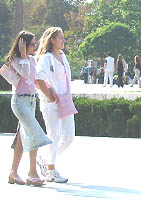 Recently, BGO GEMINI has developed regional LGBT groups in order to better respond the demands of our members and beneficiaries outside Sofia. These groups are non-formal and not official branches of the organization. This initiative of BGO Gemini was aimed at meeting with LGBT people from smaller towns in the country, since the social isolation LGBT people there face is of a higher extent as compared with the LGBT people from the capital.
Recently, BGO GEMINI has developed regional LGBT groups in order to better respond the demands of our members and beneficiaries outside Sofia. These groups are non-formal and not official branches of the organization. This initiative of BGO Gemini was aimed at meeting with LGBT people from smaller towns in the country, since the social isolation LGBT people there face is of a higher extent as compared with the LGBT people from the capital.
BGO Gemini has support groups in Plovdiv (the second biggest city in Bulgaria), Varna (the third biggest city in Bulgaria), Gabrovo, Dobrich and Blagoevgrad.
Currently there is no powerful political lobby in the country which could initiate and facilitate a change in the law towards the legal recognition of same-sex partnerships.
Meanwhile across the rest of Bulgaria
Driving in rural Bulgaria compares well to Romania. The main roads are paved and reasonably good for driving. Cargo trucks haul goods across and out of the country, slowed occasionally by a herd of goats crossing the roads or a horse cart hauling pumpkins from the field. A common sight along the way is a decrepit Lada car huffing along at 30 MPH. We rented a car and drove through the heart of Bulgaria with no serious problems other than having to stop and translate some roads signs—Bulgaria uses the Cyrillic alphabet, similar to Russia. (Romania uses the familiar Latin alphabet so we had no directional problems.)
The country is not prosperous by western standards but it has applied to join the EU in 2007 even though a good monthly salary here is only about US$170 ($140 in Romania). I can’t help wondering how these people will provide and compete with the Germans and Brits who make ten times that amount. Most of Bulgaria’s population live an agricultural life. Throughout the countryside most farmers ride around in horse carts and hand pick their potato crops and cut their hay with a scythe. Village farm houses are neat but worn like their inhabitants. Another question about the future concerns the cheap manual labor costs of these local folks and how these might interface with the expensive high tech farming costs in the West?
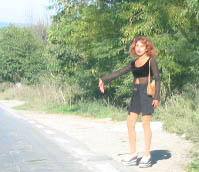
Hooker Looking for a Lift
The roadsides present a continual carnival of people and images. On several main roads heading out of town, pretending to be hitch-hikers, numerous young women-of-the-night try to flag down willing drivers. One afternoon we came across a group of young men towing a car in a most unusual way. The car had been burned out and the hulk was upside down and hitched to a horse. They were trying to drag it on its roof to town. The horse, whose ribs I could see, did not look amused! As well, so few tourists drive though many of the small remote villages here that we (and our shiny new rental car) sometimes became an attraction for the natives as we stopped to buy cheese or bread or pate for lunch at a small corner grocery.
Dense forests cover the central mountains offering sweeping views and tight switchback roads that lead out to verdant fertile plains sprouting vegetables and grasses. The central Sredna Gora mountains offer stunning views from the high top Shipka Pass where the monumental war memorial on Mount Stoletov is situated. This stone Freedom Monument was built in the 1890’s to honor a battle in the Russian-Turkish War of 1877 when 6000 Russian and Bulgarian soldiers resisted the 27,000 Turkish Ottoman force. To access the site we climbed up the 500 (at least) steps in a luminous late-afternoon fog that enshrouded the mountain. The ascent felt like entering a mythic Wagnerian set passing carved stone soldier figures frozen in battle and topped with a muscular granite tower guarded by a huge bronze lion. The historical myth here is enhanced by knowing that Alexander the Great, that great ruthless hero, also fought his way up the hill in 335 BC (with his boyfriend not far behind.)
Other appealing cities such as Veliko-Turnovo are nestled in the lower hills with its tile-roofed antique wooden houses and Internet cafes such as the bizarre I-Net that sported fantastic (styrofoam) monsters and machines sculpted onto the ceilings. The users in these dens are mostly young guys smoking and playing violent video games online. Of course I’m too refined for such silliness and use the Net only for e-mail, perusing the NY Times and checking my diminishing bank account and rising credit card balance. Across the street is a neon-lighted casino–also filled with cigarette smoke. (It’s inescapable!). Casinos are everywhere in Bulgaria with the Bingo parlors attracting the most gamers.
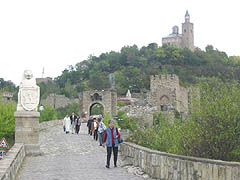
Tsaravets Castle Ruins
Veliko also offers the Tsaravets one of Bulgaria’s most extensive medieval fortress ruins (originating from the 11th century) reminding us of the very long and chaotic history of Balkan invasions over the past three millennia. It is a true wonder that Bulgaria kept any consistent identity through countless occupations by the Greeks, Romans, Turks, Ottomans, Austo-Hungarians, Nazis, and communists. Now finally there is a self-chosen confederacy with free Europe in the future European Union.
One morning in Veliko we had a good laugh as we ate breakfast in our communist-designed hotel (it looked like a vertical harmonica). On one side of us a group of American Christian missionaries (buoyant and scrubbed) were praying over their meager breakfasts (followed by post breakfast prayers). On the other side of us was a young couple who had enjoyed the hotel for other purposes than shelter. She looked a bit ruffled in her high black boots, low cut dress and cheap hair dye–and he looked satisfied. And then there was us, two queers boys from liberal Laguna Beach, in between. Truly an odd collection of travelers viewing the sites and sounds of modern and ancient Bulgaria.
As in every town and city there are the countless anonymous ugly communist-style apartment blocks where many people live in two, three or four room flats. The blocks range in height from two to twenty stories and the only interesting feature is the laundry that hangs from each balcony. During the communist occupation thousands of handsome classical ‘western’ buildings were bulldozed to make way for the ‘workers paradise’ of socialism which included erecting these more efficient and tasteless blocks. Today they can’t be taken down of course because they house so many people but journeying across the natural beauty of Eastern Europe is marred by these egregious and ubiquitous housing projects.
Bulgaria has numerous other attractive cities such as Varna and Nessibar on the Black Sea. Varna is very appealing resort city with tree-lined avenues and many umbrella-covered cafes. The magnificent cathedral on the central square is surrounded by women selling their delicately crocheted tablecloths and sweaters. One of Bulgaria’s finest archeology museums is in Varna and displays pre-grecian artifacts dating back about 6000 years. The famous 4th century BC Chalcolithic Necropolis (cemetery) was found near Varna in 1972 and contained exquisite gold carvings said to be the oldest in the world.
McDonalds, of course, has invaded Bulgaria as have the major car rental agencies and countless other western companies since Bulgaria threw open it doors to western enterprise in the early 1990’s. In virtually every city in Bulgaria the famous designer shops are open for business. However, the most popular stores by far are the ones selling mobile phones. The younger generation is addicted to them. Every town and city we visited was linked to a floating satellite somewhere and legions of young and middle age shoppers, students, mothers-with-strollers and double-breasted businessmen were all connected and having one-sided conversations that once were a sign of schizophrenia.
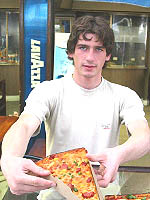 In Plovdiv, the country’s second largest city (with one gay venue—Caligula) one can shop at Fendi, Bulgari, Polo or Calvin Klein and then grab a creamy pastry at the local bake shop or a slice of pizza. This charming city also is full of ancient roman ruins and one of them, a stunning amphitheatre overlooking the city, is still used for musical and dramatic presentations. What little discretionary money the younger generation has seems to be spent on nice clothes and jewelry. Guys especially like heavy gold and silver neck chains. Since the vast majority of these folks don’t own (can’t afford) cars they have more for personal accessories.
In Plovdiv, the country’s second largest city (with one gay venue—Caligula) one can shop at Fendi, Bulgari, Polo or Calvin Klein and then grab a creamy pastry at the local bake shop or a slice of pizza. This charming city also is full of ancient roman ruins and one of them, a stunning amphitheatre overlooking the city, is still used for musical and dramatic presentations. What little discretionary money the younger generation has seems to be spent on nice clothes and jewelry. Guys especially like heavy gold and silver neck chains. Since the vast majority of these folks don’t own (can’t afford) cars they have more for personal accessories.
Tourist life is cheap here. In Plovdiv, we stayed in a four-star hotel for only $80/double and sat for an elegant four course dinner for $15 for two in the hotel’s nearly empty but elegant restaurant overlooking an ancient ruin. The appetizer was baked plums wrapped in bacon–heavenly.
Plovdiv is more casual than Sofia with numerous pedestrian streets, renovated old European facades, and a picturesque center packed with cafes, fast-food shops, more ruins, trendy brand-name shops and hawkers selling all kinds of touristy kitsch or paperback books or ice cream or religious icons. During the warm season there are nightly open-air concerts, sometimes two or three. Life, at least the evening life, appears cheerful and bright and easy. Of course on the fringes, as always, gypsy beggars can be seen looking for small change and indigents fade into the night shadows with their bags of pickings.
Back to Sofia
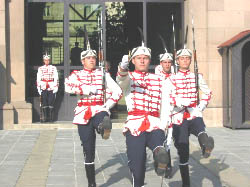 Sofia is the core city of Bulgaria. It’s central area was fortunately mostly spared from the bulldozer mentality of the communists. As a result a walk-about takes in the former king’s palace, the elegant president’s office building (where we watched the hunky honor guards in white and red jackets change on the hour), an ancient 15th century church that’s now an impressive archeology museum, a sprawling university, an inspiring cathedral that arches toward the sky as well as modern pieces such as the classy Sheraton Hotel fronted by numerous outdoor cafes serving pizza for breakfast by cute waiters—well, some of them at least.
Sofia is the core city of Bulgaria. It’s central area was fortunately mostly spared from the bulldozer mentality of the communists. As a result a walk-about takes in the former king’s palace, the elegant president’s office building (where we watched the hunky honor guards in white and red jackets change on the hour), an ancient 15th century church that’s now an impressive archeology museum, a sprawling university, an inspiring cathedral that arches toward the sky as well as modern pieces such as the classy Sheraton Hotel fronted by numerous outdoor cafes serving pizza for breakfast by cute waiters—well, some of them at least.
Speaking of which, we had another good laugh at a huge billboard ad for KFC chicken downtown. The blow-up image depicts several young women surrounding a handsome man seated and holding a bucket of fried chicken in his lap. The cruisy women are all ogling his ‘basket’ of hot food. Surely the ad designer–gay or straight–knew what he was doing.
Several kilometers outside the center is the National History Museum housed in an enormous former communist mansion. Once in a while the socialists built well and this museum is an impressive mix of horizontal and vertical lines fashioned from hardwoods and cement; it would not displease Frank Lloyd Wright. Artifacts here date to the seventh millennia BC.
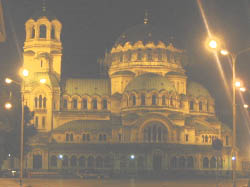
Sofia Cathedral at Night
We also stopped in to see Sofia’s only synagogue built in 1909. It reeks of age and muscular beauty having been restored in recent years. The central golden chandelier hangs from a high delicately painted dome. There is a feeling of dark yet colorful warmth to the interior. As non-Jewish visitors we looked quite fabulous in our white yarmulkes.
In the foyer of the synagogue we purchased a stamped post card with a photo of the late deputy parliament speaker Dimitar Peshev who first alerted the Romanian leaders of the impending deportation of Jews in 1943 and whose action forced King Boris to protect (most, not all) Romanian Jews against the Nazi orders. We also bought a similar post card of the late Orthodox Patriarch Stephan who was also instrumental in saving the Jews. He threatened to lie on the rail tracks before he would allow any such prisoner train to leave Bulgaria.
The Future
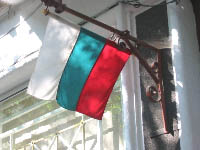
Bulgarian National Flag
Bulgaria may appear from the outside to be a quiet stepsister state to the bustling rush of Western Europe but from inside this rural yet developing land an insistent generation is moving into place. To be sure, many attitudes and ideas about governance and morality are laden with heavy conservative socialistic attitudes exercised by some obtuse authorities. Yet as the forces of modern Europe have urged them forward, these same leaders have, to their credit, chosen to open Bulgaria further thus submitting to the progressive social and economic policies required by EU membership.
The challenge and strain will not be easy. Prices will rise and jobs will be lost. Already international companies have set up business: Renault has taken ownership of the sagging Lada car company. New laws are testing the will of this conservative nation to accommodate such alien considerations as homosexuality, not just in formal legal statutes but also as LGBT citizens become more audible and visible. The gay movement is a small voice at the moment but with wholly-committed activists like Soldier that little sound will grow to a respectable chorus over the next ten years.
As she said in her story: “I started working at first voluntary with the Gemini and for the cause and I felt that this is the mission of my life. After almost three years I’m still here and working for the cause. I’m president of the organization and I’m proud of myself. Of course there are still a lot of things that should be changed here in our country but after being here and involving more and more people to help me in the work I feel better and secure for our future and the future of our children.”
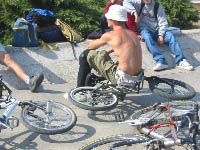
The Next Generation–Waiting
Also see:
Gay Bulgaria News & Reports 2000 to present
Gay Bulgaria Photo Galleries




